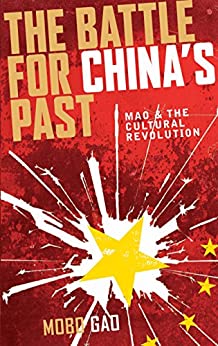This 2008 book is a significant contribution to an ongoing process whereby Chinese radicals are reappraising dominant narratives on revolutionary China and in particular on the ‘Cultural Revolution’ (CR) period of 1966-76, thereby challenging the official Chinese Communist Party (CCP) dismissive verdict over Mao’s later policies and the so-called ‘Gang of Four’.
While most of us on ‘The Left’ in the West know a fair bit about the 1917 Russian Revolution for example, our knowledge of China’s revolutionary period tends to be much less informed, and we often dismiss the Mao-led CCP as just another monolithic Stalinist deviation with all the associated horrors and a rigid, highly centralised authority that led to catastrophic socio-economic experiments, mass indoctrinations of Red Guards with Little Red Books, millions of deaths, concentration camps etc.
In The Battle for China’s Past, by using Marxian analysis Mobo Gao asks us however where we got these narratives from, and what ideological and socio-economic purposes they might serve. As a sociologist he is also interested in how we construct history through the process of memory, values and perceived identity, where we may emphasise or even distort certain events for example and diminish or erase others in pursuit of our (often-unstated) goals.
His rigorous investigation starts with an incisive questioning of the memoirs, autobiographies and biographies we are familiar with in The West, such as Mao, The Unknown Story by Jung Chang (also author of Wild Swans) and Jon Halliday. In a similar vein he also questions those non-translated high profile accounts in Chinese, whether published in mainland China, Hong Kong or Taiwan. These investigations reveal quite a lot, for example not only the privileged CCP family background of Jung Chang for example and the western bourgeois media frenzy around her ‘autobiographical’ account of the CR that had made her Wild Swans a bestseller, but also the shockingly poor/misleading academic research that went into Mao, The Unknown Story – her follow up ‘biography’ of Mao that is so chock full of wild, unsupported allegations that the finished work bears closer resemblance to a Peking Opera melodramatic plot than it does to authentic historical research.
After offering a devastating critique of such high publicity commentaries and exposing their dubious credentials, for example another account by ‘Mao’s personal doctor’ Li Zhisui, Mobo Gao then starts to look at the more recently surfacing and much less publicised accounts of the CR period, of interest to us because unlike the authors mentioned who achieved fame, recognition and fortune out of their stories, these are the accounts of workers and peasants and how they and their families experienced the CR. And the two threads of perspective are indeed radically different. We discover for example that during the CR peasants enjoyed for the first time ever a functioning and efficient health service and that their life expectancy shot up by 20 years, huge advances in agriculture were made that eliminated the formerly ever-present threat of famine since imperial times, industrial productivity rose sharply, the social profile of women was promoted, and in the communes (based on a version of the Paris Commune as proposed by Mao), both workers and peasants enjoyed, again for the first time, a significant measure of localised democratic control over their workplaces and in the running of their communities.
In the process of the book the CCP under Mao is revealed as being quite far from Orientalist perceptions of a cruel eastern despotism garbed in Stalinist costume, but a highly complex and fluctuating battlefield for rival ideas and interest groups that was played out across the era as the party tried to evolve from its origins as a pan-nationalist ‘popular front’ against US and Japanese imperialism, through heavy-handed centrally planned development efforts into belatedly adopting its own vision of a socialist programme – and where Mao was anything but ‘in total control’ – before the Dengist ‘capitalist roaders’ finally took over the party and state from 1976 onwards.
The author leaves us with the battle over China’s past still being played out today – but now under new dynamics as formerly dominant western bourgeois or neo-liberal/CCP hierarchy narratives are increasingly challenged, and with a space finally beginning to emerge, both in China and beyond, for a rigorous, balanced re-appraisal of the Cultural Revolution and Mao’s legacy and what this means for the direction of socialism today.
Kevin Boylan (April, 2020)





